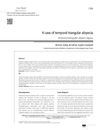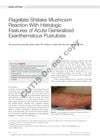
Benign skin tumors need accurate diagnosis to ensure proper treatment.
September 2009 in “Hair transplant forum international” A committee was formed to improve hair restoration for certain hair diseases by collecting and analyzing data.
 42 citations,
June 2012 in “Clinical and Experimental Dermatology”
42 citations,
June 2012 in “Clinical and Experimental Dermatology” Black dots under trichoscopy can appear in different hair and scalp conditions, not just in alopecia areata.
 December 2020 in “TURKDERM”
December 2020 in “TURKDERM” A 3-year-old boy was diagnosed with a rare, non-scarring hair loss condition called temporal triangular alopecia.
26 citations,
January 2009 in “Annals of Dermatology” Two rare bald spots on the back of the scalp were found to be lupus, not alopecia areata.
 7 citations,
July 2003 in “Clinics in Dermatology”
7 citations,
July 2003 in “Clinics in Dermatology” The article helps identify common, non-harmful skin conditions in newborns to avoid undue concern and treatment.
 August 2023 in “American Journal of Hospice and Palliative Medicine”
August 2023 in “American Journal of Hospice and Palliative Medicine” People in palliative care often have skin problems due to their main illness or other health issues, and treatments focus on comfort and quality of life.
 January 1987 in “Side effects of drugs annual”
January 1987 in “Side effects of drugs annual” Some cosmetics and dermatological drugs can cause allergic reactions and side effects, like skin irritation and systemic issues.
10 citations,
October 2018 in “JDDG Journal der Deutschen Dermatologischen Gesellschaft” Most skin conditions in Down syndrome are benign and involve dry or thickened skin.
 7 citations,
April 2022 in “Cutis”
7 citations,
April 2022 in “Cutis” Direct-to-consumer teledermatology is growing fast but raises concerns about quality of care and doctor-patient relationships.
 3 citations,
August 2022 in “Cutis”
3 citations,
August 2022 in “Cutis” Certain nail conditions can suggest thyroid problems, with different symptoms for underactive (slow, thin nails) and overactive (spoon-shaped, brittle nails) thyroid.
 3 citations,
January 2022 in “Cutis”
3 citations,
January 2022 in “Cutis” Telemedicine is effective for diagnosing hair loss, especially in people with darker skin, during the pandemic.
 3 citations,
August 2021 in “Cutis”
3 citations,
August 2021 in “Cutis” Some alternative medicine treatments might work for skin conditions, but their effectiveness and safety differ a lot.
 3 citations,
July 2021 in “Cutis”
3 citations,
July 2021 in “Cutis” New military hair rules for women promote inclusivity and prevent hair damage.
 3 citations,
June 2020 in “Cutis”
3 citations,
June 2020 in “Cutis” Poor nutrition can lead to skin diseases in hospitalized patients and should be quickly identified and treated.
 2 citations,
May 2022 in “Cutis”
2 citations,
May 2022 in “Cutis” Taking too much Albendazole can cause hair loss and other serious side effects.
 2 citations,
September 2021 in “Cutis”
2 citations,
September 2021 in “Cutis” Eating shiitake mushrooms caused a man to develop a rash similar to a skin condition known as AGEP.
 2 citations,
March 2021 in “Cutis”
2 citations,
March 2021 in “Cutis” Some breast cancer treatments, like taxanes, can cause long-term hair loss.
 1 citations,
August 2023 in “Cutis”
1 citations,
August 2023 in “Cutis” Low ferritin levels can indicate iron deficiency as a cause of hair loss.
 1 citations,
July 2023 in “Cutis”
1 citations,
July 2023 in “Cutis” Scalp rolling might help regrow hair in people with a hair loss condition called Alopecia Areata.
 1 citations,
May 2023 in “Cutis”
1 citations,
May 2023 in “Cutis” Eating disorders can cause skin problems, which may help with early diagnosis and treatment.
 1 citations,
January 2023 in “Cutis”
1 citations,
January 2023 in “Cutis” The paper concludes that the new medication baricitinib needs further testing in a more diverse group of patients with alopecia areata.
 1 citations,
January 2023 in “Cutis”
1 citations,
January 2023 in “Cutis” You might not need to stop cancer treatment if you get a rare skin reaction from EGFR inhibitors, as skin treatments can help manage it.
 1 citations,
February 2021 in “Cutis”
1 citations,
February 2021 in “Cutis” COVID-19 can cause various skin symptoms, including rashes and lesions, which often appear early and can help in timely diagnosis.
Early diagnosis and personalized treatment are crucial for managing pediatric androgenetic alopecia.

Media coverage led to more dermatologists prescribing low-dose oral minoxidil for hair loss.

The article suggests that patients with Frontal Fibrosing Alopecia may have more contact allergies, but it doesn't prove that allergies cause the condition.

Topical minoxidil and oral finasteride and dutasteride are the most effective treatments for male and female pattern hair loss, but study quality varies.

Higher bad cholesterol levels are linked to more severe female pattern hair loss.

Some blood thinners and blood pressure medicines can cause hair loss, which usually starts 1 to 6 months after beginning the medication.


























